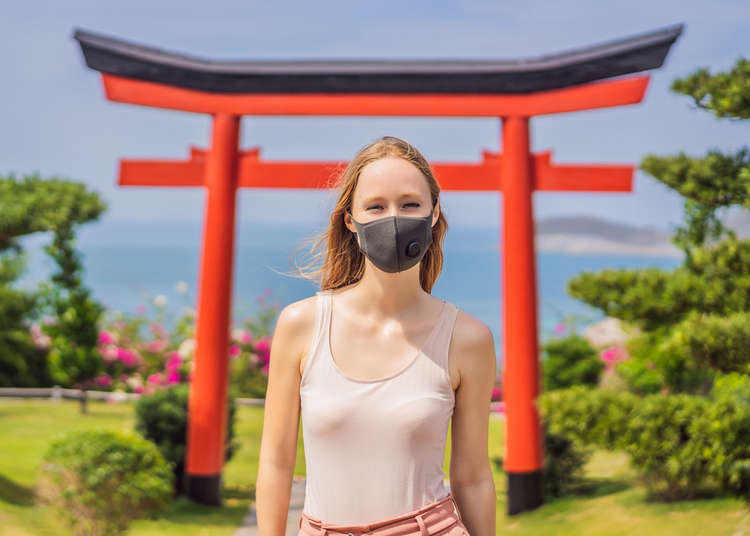
Living with Covid: What’s Life in Japan Like Now - 5 Expats Share Their Experiences
- Written by: Sohail Oz Ali
Since the COVID-19 pandemic began, many people worldwide have noticed the changes in their lives. Whether it be the increased use of masks, hand sanitizer, and handwashing or the social distancing and limited capacity of public areas like restaurants and public gatherings, everyone has been affected by this virus.
Everyday lives have been disrupted at work, at home, among friends and family, and travel. Grandparents can’t see their grandchildren, friends need to stay in touch online, and many people have been isolated from their families and homes because of travel bans.
Since Japan had its first case of COVID-19 in mid-January and within months, the country closed down schools, went on a state of emergency, and restricted travel from over 100 countries from North and South America, Europe, Africa, and parts of Asia.
With this restriction on travel and strict regulations on exiting and entering Japan, many expats have been forced by circumstances to cancel trips or visits to family back home. Many have had to postpone weddings, miss funerals, baby showers, and birthdays over fears that leaving Japan might mean they can’t return or risk losing their employment or home.
Here are the stories of five foreigners living in Japan and how the pandemic has affected their lives.
1. Doing business has changed lots
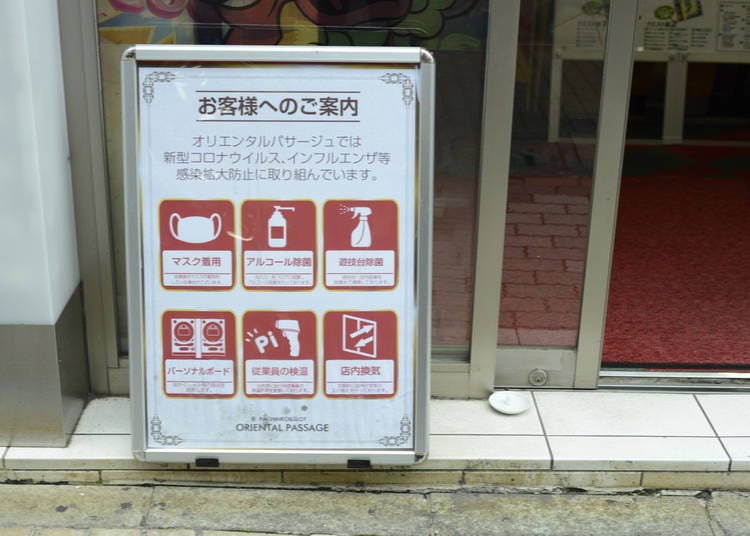
No one can deny that life before and after COVID-19 is very different. Even if the virus hasn’t affected you or anyone you know personally, the effects have rippled outward into everyone’s life whether it be at work, with friends and family or out and about in everyday life. And life in Japan has also changed quite drastically.
For John (an American in his 50s; English teacher in Shizuoka), even before the pandemic, a big chunk of his classes were online so going into lockdown or having school closures didn’t affect his income. Adversely, the lockdown and limited chances for children to attend eikaiwa (English conversation) schools in person brought many kids to take English lessons online.
The social distance guidelines and opportunities for kids to have connections to each other and teachers is one aspect of the pandemic that might be robbing kids of normal school life. But wearing a face shield for children to see his face, is a way that John has found to protect himself and kids while still being able to perform his duties.
Although John was lucky and was able to take advantage of the changes that have come about since the pandemic, Brad (a Canadian in his 30s; stay-at-home father in Chiba), unfortunately, was about to begin a job search when cases started popping up in Japan. He had to change course and become a stay-at-home father, while his wife became their family’s sole income.
When Brad’s wife was pregnant and lived over an hour commute from the Tokyo office, the company created a work-at-home environment. She was provided all the tools and equipment she needed to continue working until her baby was born, and she then went on maternity leave.
Brad, who had just moved into a new house, could not get a job. “Had Covid not happened, I think I would either be working or looking for an English teaching job after getting my permanent residency. But the risk of getting Covid is too high since I’d be around people so much, and if my wife and/or I got sick, we’d have trouble taking care of the baby, which is already hard enough as it is.”
Restrictions on events
Along with business closures, the Tokyo 2020 Olympics’ postponement, many sporting events, concerts, festivals, and tourist spots had to be shut down or canceled. Many drinking spots, nightclubs, bars, hostess clubs, and restaurants also closed their doors, including the live house, where Stella (an Australian in her 30s; bartender and barista in Tokyo) has her weekend gig. Recently it has reopened with limited capacity and social distancing guidelines, but Stella has been unable to return to work as staff requirements have been reduced.
“It really sucks because a lot of musicians who struggle to get their music heard, sell their merchandise and CDs, and promote themselves through these small venues had to put their dreams and careers on hold. And even now that things are slowly opening, only the hardcore fans are returning. Also, since Japan [still has immigration restrictions], a lot of Japanese music fans from abroad can’t come to Tokyo to support the musicians.”
At the same time, when many places started closing their doors or events started being canceled, like Stella, Kay (an American in her 30s; English teacher in Hokkaido) was also sent home. But unlike many people who either lost their jobs or were temporarily laid off without pay, Kay was lucky. “I was still being paid during the state of emergency, so I, fortunately, didn’t lose any income.”

Teaching (in-person classes)
Alex, an assistant language teacher (ALT), had to work from home during the state of emergency but was paid his full salary as well. He returned to work when things started opening up in June 2020, but noticed many changes when he arrived at work including wearing masks, temperature checks every morning, and handwashing and hand sanitizer stations spread throughout the school for both students and staff.
The classes John does teach in person have changed a bit, as well. John mentioned, “Because I’m a language instructor, it’s important for the kids to see my mouth while teaching, so I don’t wear a mask in the classroom. Instead, I have a plastic barrier between the kids and myself.” He also added that children couldn’t climb over him anymore.
The new normal seems to be glass or plastic barriers in classrooms, offices, cafes and restaurants, and anywhere many people might need to spend time socially distanced.

Telecommuting’s impact
Not all businesses are essential, and some decided to close their doors until things returned back to normal or at least started to improve.
Stella mentioned that her day job at the coffee shop had changed dramatically after the pandemic. “Obviously, during the lockdown, the shop was virtually closed. We stayed open for people to get take out coffee, but the seating area was closed and very few people even came in for take-out. Then as businesses started opening back up and people started going back to their daily lives, we opened with 50% capacity. People are required to wear masks until they sit down, have their temperature checked, and use a hand sanitizer that is placed at the entrance. It’s slowly getting back to normal, but it’s not as fun and casual as before. Everyone is scared to come close to each other and masks make it hard to have a chat with customers. The aura of the place has definitely changed.”
Closing of businesses and work from home measures by many companies has also changed the way people in Japan work, commute and relate to people around them.
The pandemic has had a huge impact on Brad’s life as he had to decide if he would risk his and his family’s health by finding a job or stay at home and try to survive on his wife’s income. Because Brad lives in a small town and doesn’t speak Japanese, he would most likely have to commute to a bigger city in Chiba or Tokyo, which would require him to use public transportation and might elevate the chance of his getting infected.
Many people in Japan don’t have the luxury to work from home and must commute in and out of city centers everyday in packed trains and buses. And those who’s shops, companies or offices closed down have had to figure out a way to save their careers and protect their health.
2. Closing of borders presented a challenge
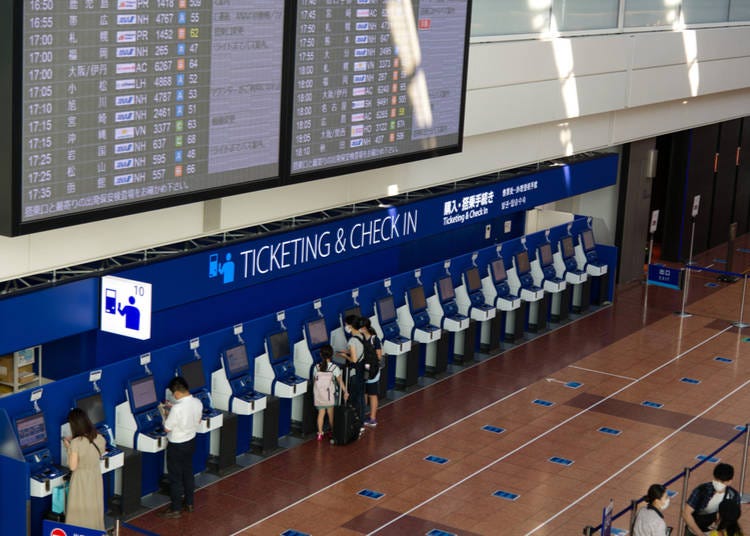
When the pandemic hit, Japan was quick to protect its citizens by allowing Japanese nationals in Wuhan to return to Japan and close its borders to many countries before the virus could continue to enter Japan and increase community spread.
Despite the closing of borders, the virus still made its way through Japan and is currently increasing in both infected and death count. But the proactive measures that the government chose by closing borders early most likely helped reduce the speed and spread of the virus.
Although closing borders helped diminish new cases from coming into the country, it also caused problems for some already in Japan.
Brad’s wife, who is originally from China but now a Japanese citizen, was hoping to have her parents live with her for the first year of her baby’s life. However, with the pandemic, closing of borders, and restrictions on people coming into Japan, her parents were not allowed into the country. That left both Brad and his wife to take care of their baby without any other support. “We wake up when the baby wakes up, feed, change diapers, play, make meals for ourselves, and we take turns eating. One of us is always with the baby since he’s so mobile and active the moment he wakes up. It’s fairly relentless since it’s just us; family is outside the closed borders.”
Stella is quite independent and is okay with not traveling outside Japan but was thinking about going to Australia to visit her family for Christmas. Currently, Australian residents are allowed to return to Japan as long they undergo a 14-day quarantine process.
“It’s nice to know I can go back for Christmas and am considering it, but now, with the increase in cases, I am not sure what will happen. I don’t want to get stuck and not be able to return to Japan because my life is here.”
3. Positive about the way Japan has been keeping the virus under control
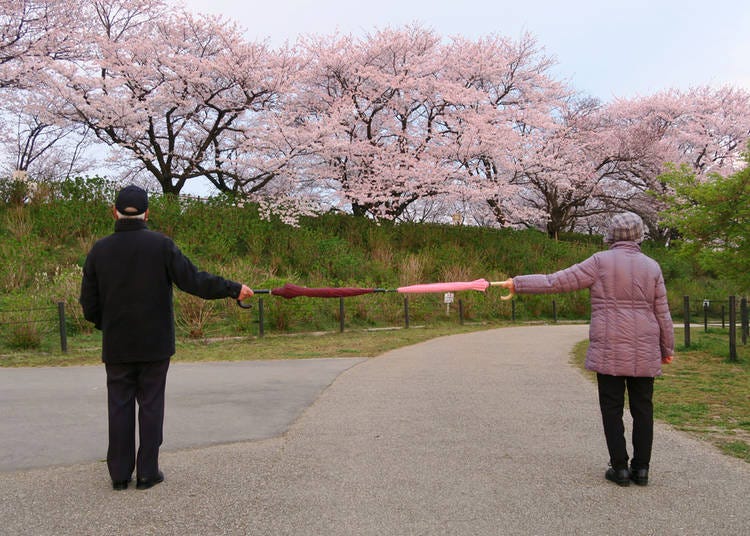
Japan, which was already a country whose people use masks during cold and flu season as well as allergy season, has embraced wearing masks, washing hands, and social distancing without much controversy.
And what started as a small outbreak on a cruise ship docked at Yokohama has turned into a year-long pandemic that has hit Tokyo the hardest. With over 30,000 cases and over 400 deaths, Japan’s largest and most populated city had to enact strict regulations and quick measures to ensure it didn’t see numbers like other big cities around the world like London or New York.
Closing of the borders and lack of job options was tough for Brad but he feels Japan has been doing a good job keeping the virus under control. “The people of Japan have been pretty good so far, wearing masks, keeping as much distance as they can in such cramped conditions.” He is also thankful for the 100,000 yen (about $1,000) payout per person his family received from the government for coronavirus relief.
4. How we socialize has changed considerably in the new normal
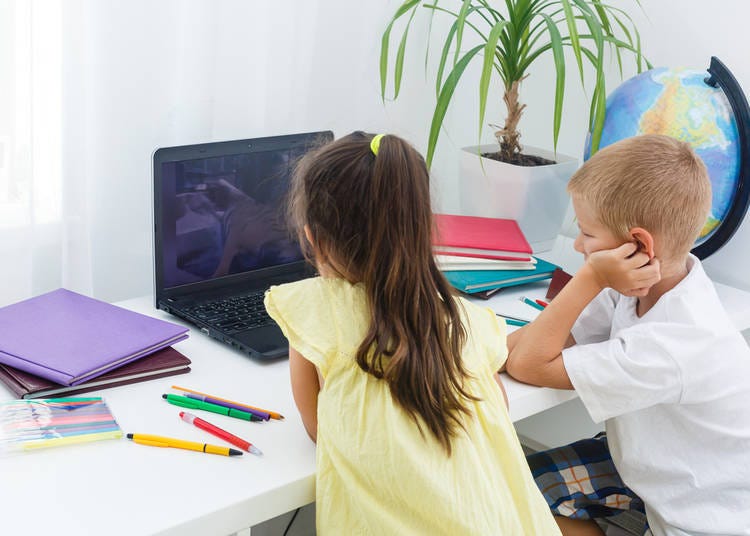
In terms of John’s personal life, he seems to be coping fine with the lack of social gatherings and interaction with people. “I’ve stopped going to restaurants or anywhere people gather in groups. I’m fine with it; I’m not experiencing any depression or anything like that. I don’t like going places where lots of people congregate anyway so staying home and watching TV has finally lifted me from being lazy to being a man that is trying to take care of society by staying home.”
Stella lives alone in her apartment near Shibuya and often would hang out with friends at cafes and go shopping. “I still meet up with my friends once in a while, but it’s a lot less than before, and we all wear masks and try to do things outdoors or visit places that have open spaces.”
Kay was quite a social person who enjoys meeting people, attending parties, gatherings and participating in local events like the Sapporo Snow Festival. Still, after her daughter’s birth, she has been less and less active outside the home. “My social life has been pretty dead since my first child was born two years ago anyway, so there were no big changes really that affected my personal life due to Covid.”
Since Alex (a Malaysian in his 40s; English teacher in Ibaraki) was working from home, he had minimal contact with the staff or the community around him. And with community centers, churches, and events canceled, there was no place for him to make friends, explore the town or get accustomed to life in Japan.
Just before the pandemic, Alex had met a group of friends through a church group and had even traveled to different parts of Japan to see the country and experience the culture. But with limited travel and entertainment options, Alex was left to find things he could do locally.
Many tourist attractions, festivals, events, and concerts were canceled, making it hard for those looking to enjoy Japan’s tourism to travel. But, Alex was able to find things in his town that were still open and interesting despite closures. Explaining his options during the pandemic, Alex said not being able to travel to other parts of Japan “pushed me to eventually join a Kenjutsu class, a gym, and attend local activities to get back in shape after the Coronavirus situation started to go down.”
5. Shopping, work: moving relationships online was huge
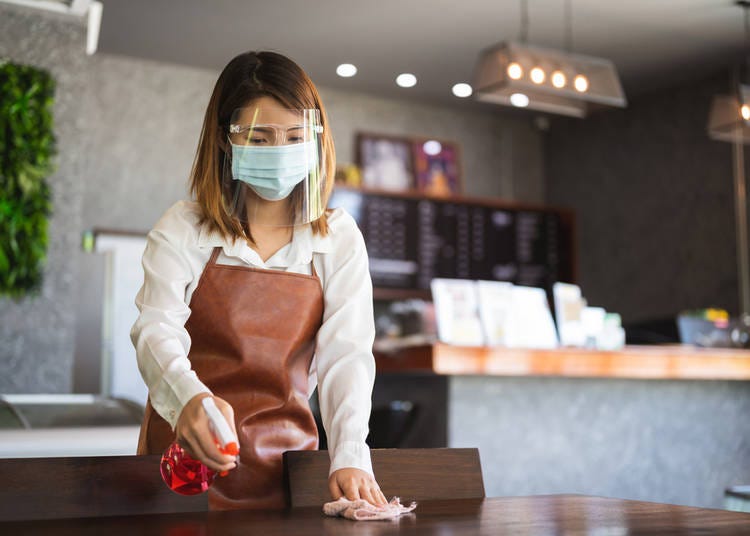
Kay found some of the biggest changes about having to stay home a lot more included both shopping and entertainment habits. “I was able to play a few new games and binge watch some TV shows. And I do pretty much all of my shopping online, even groceries.”
Brad has had to change many things about his life to accommodate his new family and adjust to COVID-19. No longer does Brad go to Akihabara to check out manga and anime like he used to or go to the theater to watch the newest superhero movies. He stays home and surfs the net, and watches streamed movies and shops online as well.
His outings are only essential ones. “I usually only go out for grocery shopping. Maybe paperwork or doctor visits. Very rarely, we’ll walk around the neighborhood as a family. Only during the day when it’s quiet and empty. We do go out on our balcony to get sun though, and we all take vitamin D.” He also had to change his shopping habits, now “shopping for things online mostly, leaving things in the front hall for a couple of days.”
As an extra precaution, John does notice some changes he’s had to make. “I’m not inviting people over to the house. I can’t play my guitar at the studio with my band. Washing my hands a little more often at school. I have noticed that even though I work in a petri dish of every cold and flu virus imaginable, I haven’t even gotten a sniffle this year. Everyone masked up and washing their hands has been a good thing as far as seasonal colds, and the flu is concerned.”
6. Maintaining ties with friends and family back home is tough
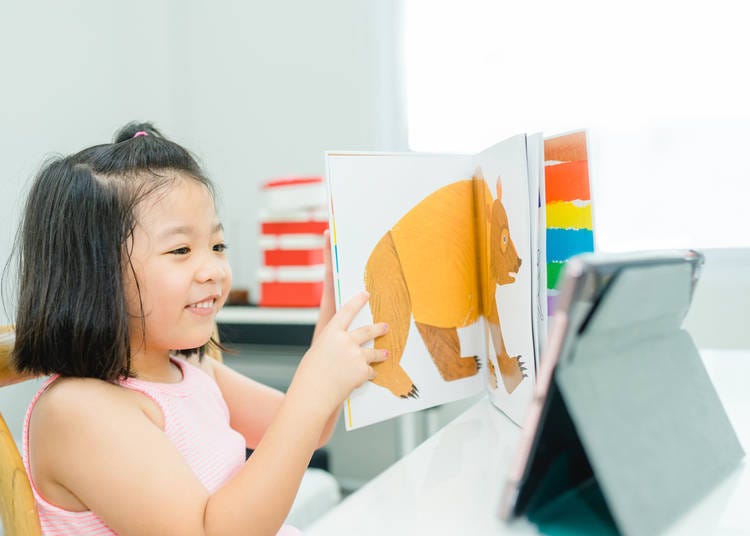
More than anything, Kay is worried about her status in Japan despite being a permanent resident visa holder. “I’m a permanent resident, and I pursued that status thinking that I’d be able to live here without any possibility of being separated from my family due to visa issues. However, it’s scary and upsetting to think that if I had happened to be abroad or needed to go home for a family emergency during this time, I wouldn’t have been able to return to my life and family here for many months. I really feel for all the families that were separated.”
Despite the rise in cases and the limited opportunities to hang out with friends, Kay does make time to meet up with her friends once in a while in an outdoor area. “Since Hokkaido is so big and there are lots of outdoor activities still available despite the pandemic, my friends and I usually go hiking in the mountains or do a bike trail and picnic.” Enjoying the Hokkaido scenery and nature is one of the ways to enjoy the country while staying safe.
The not knowing of when travel will return to normal or what rules and regulations may change make Stella uncertain about travel until the virus is under control. “I think I might just wait for the vaccine to be released and for the world to go back to normal before I do any travel outside Japan.”
7. Japan’s Covid requirements seem reasonable
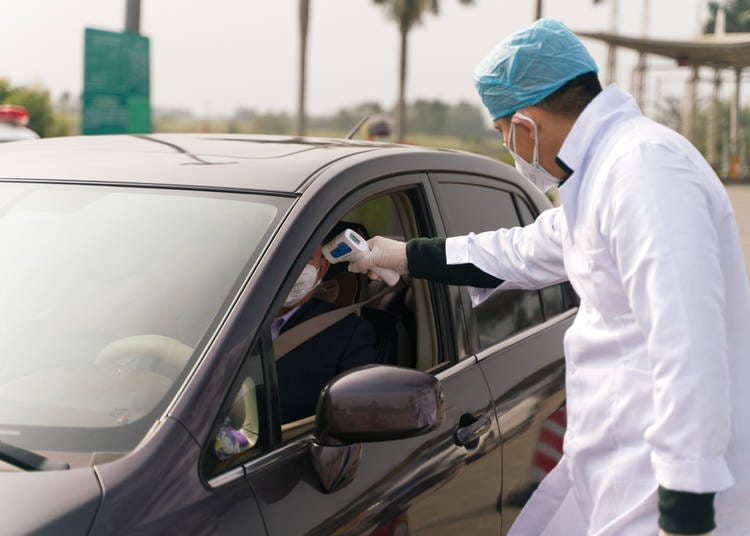
The only real complaint that John had with Japan and its handling of the pandemic was people complaining about it. Trying to be optimistic and positive, John feels, “It’s not the end of the world. Life will return in due time.”
Recently with Go To Travel and Go To Eat campaigns created by the government to encourage tourism internally, many restaurants, tourist attractions, hotels, and retail centers offer big discounts to attract consumers. Since the campaign began, many more places have slowly opened their doors, and Alex finds it a lot easier to meet his newly made church and community friends.
“It’s still tough to think about traveling because cases are up, but at least Japan seems to have a lot of safety precautions and social distancing rules. And although I have finally made a good group of friends in my town, it’s good to know that I have the options to see other parts of Japan.”
Asked if he thought the government made any mistakes or if he would change anything, Brad said, “We were disappointed because we feel they ended the lockdown a bit early. The numbers were down, and they should have kept it going until the numbers were zero for a while. Maybe they would have had to help businesses financially, but then Covid would be over like in Taiwan and New Zealand. Instead, it’s dragging on and people like us are staying in, waiting it out.”
Stella’s feelings of how Japan handled the pandemic and its current situation seem quite optimistic. “Australia and New Zealand both did amazing jobs quickly organizing and fighting the spread of Covid. I think Japan also did its best to limit the spread. From the first cases, the government had a task force and Prime Minister Abe went ahead with the state of emergency. I think that really helped because it really slowed down the spread and also gave the people of Japan a big shock, which helped ensure everyone followed guidelines and stayed safe. Other countries haven’t been so lucky.”
8. Traveling and eating during Covid is still a challenge
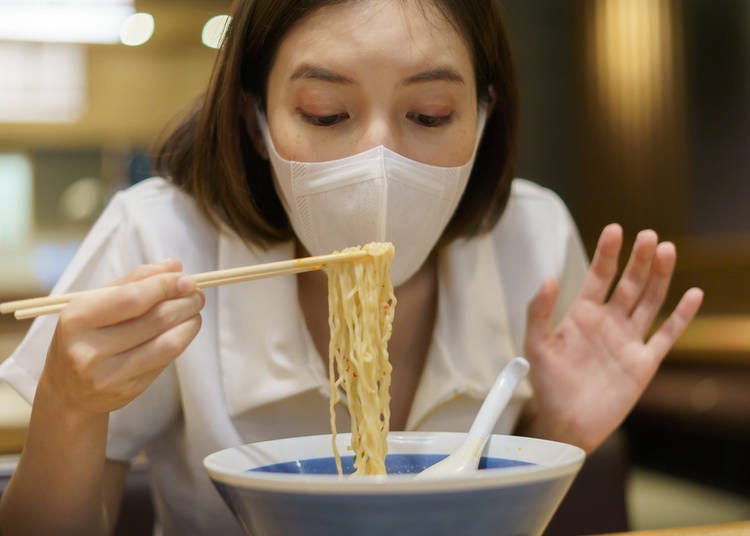
With spikes in big cities like Tokyo, Osaka, and in Sapporo, the government and businesses are once again starting to prepare for a potential third wave. This means that limited capacity, shorter opening hours for certain businesses, more temperature checkpoints, and increased mask and handwashing regulations might be needed, along with more testing and contact tracing.
“The most annoying thing about the Covid situation was not being able to attend the Cherry Blossom festival and going to Tokyo,” said Alex about some challenges with travel. This was going to be his first cherry blossom viewing season in Japan and he was looking forward to take part in the hanami parties that happen in the parks around Japan.
Every spring, Japan hosts famous cherry blossom viewing parties across Japan with some of Tokyo’s most famous places being Yoyogi Park and Ueno Park. Unfortunately, due to the pandemic, the parks were only open for walkthrough viewings and prohibited people from sitting under the trees and drinking and eating which is an annual Japanese tradition.
In his 50’s and more of a homebody, John didn’t go out to parties or social gatherings much before the pandemic, so staying home, cooking, eating, and watching tv is similar to what life was like before. Although he did admit, he got “a little less exercise than usual.”
9. Mental Health
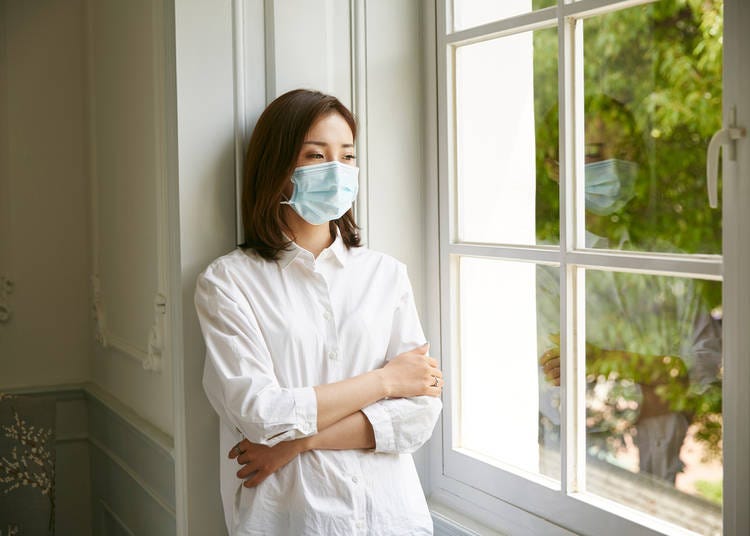
During the school closures, John spent more time reading and relaxing which helped his mental health. But since many places like schools, gyms, restaurants, and shopping malls have reopened since June, life for John has been pretty normal.
And Kay also said staying at home improved her mental and physical health. “I didn’t have to think about work and I got to spend plenty of time with my family. My partner normally works a lot but was also working from home during that time, so it was really nice having them around for a change.”
In Japan, where work ethic is strong and many companies expect workers to put work before life and sometimes health, taking a break from the stress of work-life and spending time on personal health has been a silver lining for some. Unlike many people who have reported issues like depression and adverse outcomes from being isolated during the pandemic, Kay found an opportunity to be with her family.
However, the pandemic took a toll on Alex’s social life and mental well-being more than anything. “Healthwise, I started eating unhealthy foods and went to my local karaoke bar for company. I was not exercising either.”
Living in a small town in Ibaraki, with no family and no friends, new to his school, and not speaking the language, Alex’s biggest problem was communication and socialization in his new town. He didn’t have a support group of friends or peers he could ask for help. “The pandemic affected me personally since I had no outside contact with my school, church, and community center,” said Alex when first confronted with lockdowns and isolation.
Stella who loves shopping, drinking, and socializing was hit hard with the closures and cancellations. “My entire life in Japan revolves around people. I love music and parties and going to see concerts. So when all that ended, I was stuck at home alone with nothing to do. It was hard for me to cope at first.”
10. Life Changes
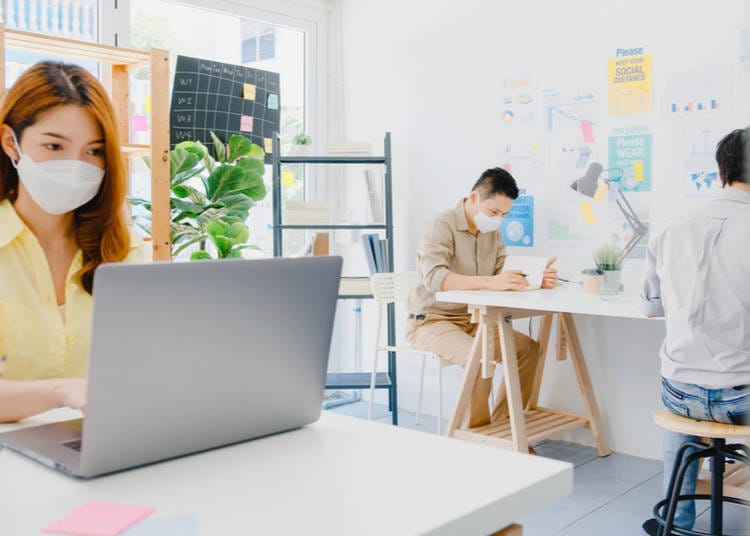
Unlike John, who seems to feel the virus is not as bad as the media reports, Brad seems to be very worried about both his health and the health of his wife and infant. “We don’t want the baby to get sick, even if he’s likely to survive, he could have lasting health issues because of it, he’s also too young to get over it easily, and who wants their baby to get sick at all really.”
Kay also mentioned changes to her life. “I wear a mask, wash and sanitize my hands frequently, and avoid going out as much as possible.” And although masks are popular in Japan, Kay is not a big fan. “I used to think masks were stupid and ineffective so I never wore them, but now they’re a necessity. I get that I have to wear them, but I hate them. I always feel like I’m suffocating, and they make my skin break out really badly. But on the bright side, at least they cover most of my face! I also carry hand sanitizer with me now.”
Stella has lived in Japan for a long time and loves going on road trips across Japan. She doesn’t feel safe traveling by air or rail. “I know Japan is encouraging people to travel but I think there are some transportation options that are safer than others. I’m not too thrilled with the Go To Travel and Go To Eat campaigns they have going. They’re allowing people to track their germs and viruses around the country. I get it, the economy needs people to move around, but, I still don’t like it. Instead, I would recommend renting a car and traveling that way. The highways are great and with an ETC [electronic toll collection] for highway tolls, you can save a lot of money. It’s also good to have a car so you can go off the beaten path places that public transportation doesn’t go.”
The 1.7 trillion yen Go To Travel campaign started in July by the government and is set to run until January 2021. It is an economic initiative that was created in hopes of jump-starting the economy and encourage more tourism. But some believe that helping the economy might also help increase the spread of the virus, and travelers from one prefecture might inadvertently bring it with them to other parts of Japan that currently don’t have a high infection rate.

The situation seems to be quite different for people depending on their visa status, career, country of origin, and life circumstances. As winter approaches and Japan braces for a third wave, both Japanese and foreigners living in Japan are hoping that Japan can balance the need for strict regulations, safety policies, and available medical resources with the need for economic growth and protecting people’s rights.
With vaccines on the horizon, only time will tell when Covid-19 will be just a historical entry in the list of past outbreaks like SARS, H1N1, and The Spanish Flu.
Until then, the best thing we can do is wash our hands, wear a mask, and social distance as much as possible. Much like the expats mentioned above, everyone has had things about their life they have had to change or adjust to, and most likely, there are more changes to come. But with the right attitude and support from our friends, family, community, and government, things will hopefully be brighter in 2021.
Sohail Oz Ali is a Canadian Youtuber, author and blogger who has lived in Hokkaido, Nagoya and now resides in Chiba. Between visits to Karaoke and revolving sushi restaurants, he enjoys walking his dog, watching Japanese love dramas and teaching English. You can also find him roaming the streets of Japan looking for the next big YouTube video trends.
*Prices and options mentioned are subject to change.
*Unless stated otherwise, all prices include tax.
Popular Tours & Activitiess
Recommended places for you
-

Kanzenkoshitsuyakinikutabehodai Gyugyu Paradise Sannomiya
Yakiniku
Kobe, Sannomiya, Kitano
-

ISHIDAYA Hanare
Yakiniku
Kobe, Sannomiya, Kitano
-
Appealing

Rukku and Uohei
Izakaya
Sapporo / Chitose
-

Jukuseiniku-to Namamottsuarera Nikubaru Italian Nikutaria Sannomiya
Izakaya
Kobe, Sannomiya, Kitano
-

Kambei Sannomiyahonten
Yakiniku
Kobe, Sannomiya, Kitano
-
Goods

Yoshida Gennojo-Roho Kyoto Buddhist Altars
Gift Shops
Nijo Castle, Kyoto Imperial Palace
-

2025 Autumn Colors Report: Kurobe Gorge Nearing Peak
by: Timothy Sullivan
-

A Travel Game Changer! Go Hands-Free Between Tokyo and Kyoto with LUGGAGE EXPRESS by JTB and JR Tokai
by: Guest Contributor
-

See Asakusa and Tokyo Skytree® in a New Light at the "Také Akari" Festival (Winter 2025-2026)
by: Guest Contributor
-

2025 Japan Autumn Color Report: Tokyo's Ginkgo Trees Starting to Glow
by: Timothy Sullivan
-

LaLaport TOKYO-BAY North Building Now Open: Shop, Dine & Enjoy Events at LaLa arena, Just 2 Stops from Disney
by: Wemmy Chau
-
Ad
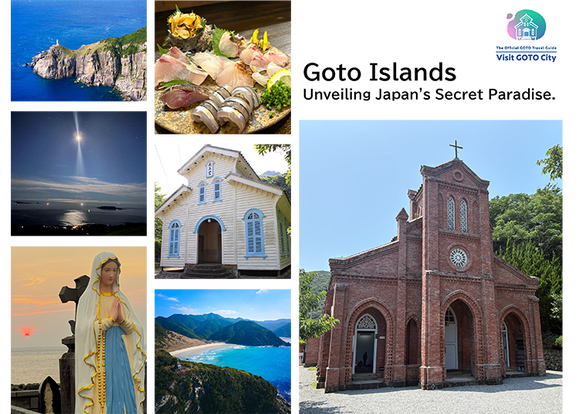
Walk in the Footsteps of Believers: A 4-Day Pilgrimage Across Goto Islands, Nagasaki Prefecture
by: Yohei Kato
-
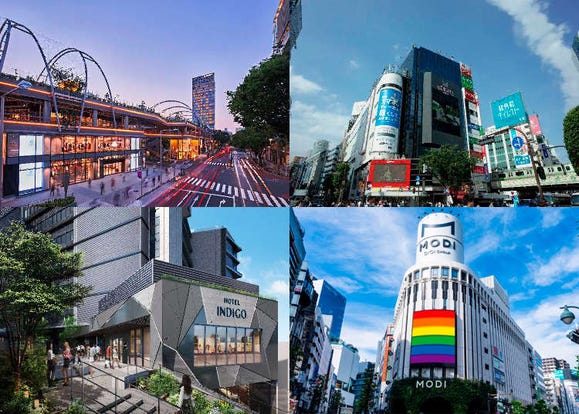
The Ultimate Guide to Shopping in Shibuya 2025: 42 Must-Visit Stores & Tax-Free Deals
by: Ran Tanaka
-

Why You Need to Try Sapporo Soup Curry: All About The Iconic Food of Japan's North (Recommended Restaurants & More)
by: Nobuka Kawashima
-

The Best of Japan: 11 Major Cities Every Traveler Should Visit
-

What to Pack for Japan: 8 Essential Things for a Hassle-Free Trip
-

Iwate Bucket List: 20 Best Things to Do in Iwate Prefecture For Tourists (Attractions, Food, Activities)
-

30 Cool & Quirky Things to Do in Shibuya, Tokyo’s Iconic Neighborhood
- #best sushi japan
- #what to do in odaiba
- #what to bring to japan
- #new years in tokyo
- #best ramen japan
- #what to buy in ameyoko
- #japanese nail trends
- #things to do japan
- #onsen tattoo friendly tokyo
- #daiso
- #best coffee japan
- #best japanese soft drinks
- #best yakiniku japan
- #japanese fashion culture
- #japanese convenience store snacks













